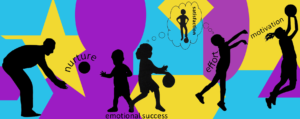Robyn’s N.E.S.T. was developed to meet the needs of caregivers who want to spend more time enjoying their children and less time frustrated. All children face stressors throughout their development. Teaching a child the appropriate tools to identify and cope with such stressors is highly rewarding. Working with caregivers to likewise help support their children cope more effectively will dramatically, improve unwanted behaviors. I find empowering an entire family provides even more fulfillment.
Robyn’s N.E.S.T. emphasizes the importance of Nurturing Emotional Success (within a child, the home, and school environments) Together (the child, care givers, and of course Us!) At Robyn’s N.E.ST. we simplify our interactions, provide a feeling of comfortability for each individual, and meet the child on his or her level. That’s when remarkable things begin to happen – stressors fade. Often, all it takes is learning to communicate effectively, going beyond words to a space of simply understanding. I enjoy working with typically developing children, as well as those who may have more diverse physical or mental needs. I develop or modify action based interventions that help every child achieve his or her best self within your unique family!
Nurturing
Nurture is to care for and influence growth. Think about how a caregiver interacts with a child who is beginning to talk or take his or her first steps. These are perfect examples of developmental milestones that are nurtured by positive experiences. Many frustrations arise when a child continues on this natural progression and begins to develop a stronger sense of self in an environment of rules and expectations. Often, as children age, they begin to engage in a battle of wills with their caregivers, demonstrating defiant behaviors, tantrums, and limit testing. Caregivers are told, “Don’t worry, it’s common for children to go through these stages.” Common or not, disruptive behaviors leave both caregivers and children feeling miserable. I work with caregivers to implement new ways of encouraging a child’s sense of self through supportive actions that reduce disruptive behaviors.
Emotional
Emotion is a natural state of mind resulting from a situation. Emotions are often overlooked as simply the umbrella term for basic feelings; happy, sad, angry etc. When I address emotion, I acknowledge instinctive internal reactions one might be experiencing and address how a child decides to respond to what he or she might be thinking, and or physically feeling. This information helps me teach a child how to identify, embrace and respond to emotions in a healthy way. I believe it is just as important to teach caregivers how to best encourage or nurture these new behaviors in an individual child.
Success
Success is the achievement of a favorable outcome. Have you ever had the opportunity to witness a child’s delight when he or she finally “did it” or “get it” for the first time? Children tend to express this moment with either a raw emotion of shock, a momentary frantic search to see if anyone was there to witness the event, or a magical glimmer in their eye that makes the onlooker feel, momentarily, he or she could actually see the child’s “ah ha” moment as it registered. Many of these early on successes cause a wave of pride not only for the child, but often the caregiver and any onlookers as well. It is a powerful feeling, one that inspires much of what I do. I take great pleasure not only in witnessing this magic, but helping others to do so as well. When working with children and caregivers I make sure everyone comes away from the experience having learned something of which they can be proud. Everyone is a success story.
TOGETHER
Together is with one another. Have you ever heard the African proverb, “It takes a village to raise a child?” While the term may have been around well before our time, I believe the saying continues to represent a valuable lesson across cultures today. Whether it be a set of eyes watching over the children while parents gather food, a parent getting advice from the neighbor about how to soothe a teething baby, family members providing childcare, or something as basic as a passerby offering advice; we are reminded that raising a child is not meant to be a job for just one or two people. That’s right, you can stop feeling guilty about not “knowing it all” or “being good at everything.” As a caregiver you’re not expected, or even supposed, to work alone! So let’s begin…
